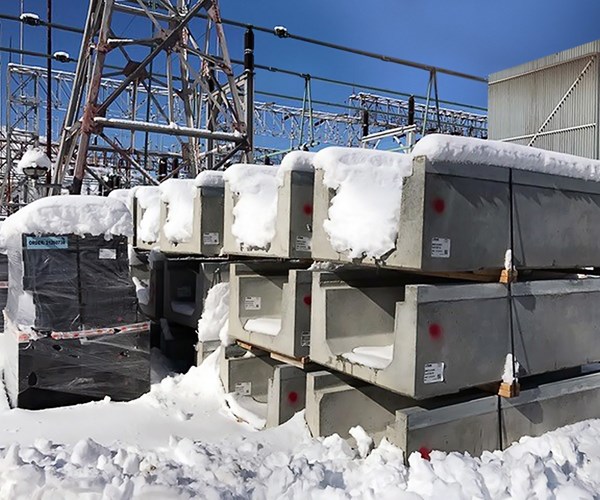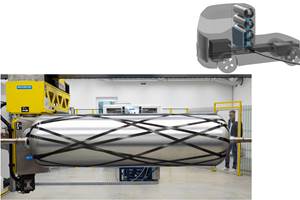An under-appreciated industrial application
A humble industrial application, manholes and trench access covers, has turned out to be a successful venture for composite manhole supplier Fibrelite.

Fibrelite’s composite trench covers fit over Trenwa’s precast concrete trenches that carry electrical cabling, at this US utility substation.
A humble industrial application, manholes and trench access covers, has turned out to be a cost-effective and successful venture for Fibrelite (Skipton, North Yorkshire, UK, an OPW Company, Hamilton, OH, US), one of several suppliers of composite manhole covers. Fibrelite, in 2014, teamed with precast concrete trench manufacturer Trenwa Inc. (Ft. Thomas, KY, US) in a strategic partnership to create a combined product offering: Trenwa’s heavy-duty precast concrete road crossing trenches topped with Fibrelite’s traffic-rated composite trench covers. Together the two products provide long-term protection for underground utilities running across road crossings while enabling safe and fast manual access for monitoring and maintenance. CW reported on the partnership in 2014: https://www.compositesworld.com/news/fibrelite-trenwa-launch-new-composite-trench-covers. Fibrelite’s engineered composites replace metal and concrete materials, to solve manual handling and lifting injuries as well as corrosion issues associated with heave legacy covers.

Trenwa’s precast concrete trenches, over which Fibrelite’s covers fit securely.
In the three years since the partnership began, Trenwa has sold well over a hundred of their precast trench systems integrating Fibrelite trench covers, for use in electrical substations, wastewater treatment plants, chemical refineries and many other applications across North America. “Combining high-performance, lightweight Fibrelite lids with our low-cost precast trench bases delivers a very high-value solution for our customers,” says George Schurr, Trenwa’s president and COO. “They receive unparalleled strength and durability at a lower cost than has ever been seen in the market.” To meet demand, Trenwa and Fibrelite have worked to design and manufacture custom-molded composite covers to fit Trenwa’s existing line of precast multi-duty trench systems. “I am excited to see our partnership with Trenwa growing as their customer base continues to adopt our lightweight, corrosion-resistant composite trench covers,” adds Jim Goodman, Fibrelite’s key US account manager.
The advantages of the Fibrelite covers paired with precast concrete trenches were recently illustrated by a project at a new electrical substation owned by a US utility provider. Substations require the concrete trenches to contain and protect the substation’s numerous underground electric conduits and cabling, and they range from 10 – 48 inches wide, or 25 cm to 1.2m wide. Where trenches cross access roads, the trench covers must support load ratings of HS20 (i.e., a 32,000-lb or 14,545 kg axle load) to handle heavy-duty vehicles such as mobile cranes. Precast trenches are frequently preferred for their ease of installation and consistent fabrication. The problem is that the concrete or metal covers over those trenches can weigh many hundreds of pounds and are therefore difficult to remove and replace. In addition, environmental factors (rain and snow, road salts) cause metal covers to corrode and concrete covers to crack, fracture or crumble.
In contrast, the Fibrelite trench covers are extremely durable, non-electrically conductive, resistant to chemicals, not adversely affected by extreme weather or environmental conditions and unattractive to thieves looking for scrap metal. The covers are also light enough to be safely and easily removed by two operators when monitoring or maintenance of the conduits or cables in the trench is required. It’s an ergonomic yet affordable long-term solution for these omnipresent yet little-noticed parts, says Fibrelite, the maker of the first composite manhole cover. Fibrelite products are manufactured in the US, UK and Malaysia and supported by a global network of distributors: https://www.fibrelite.com/.
Related Content
Welding is not bonding
Discussion of the issues in our understanding of thermoplastic composite welded structures and certification of the latest materials and welding technologies for future airframes.
Read MorePlant tour: Teijin Carbon America Inc., Greenwood, S.C., U.S.
In 2018, Teijin broke ground on a facility that is reportedly the largest capacity carbon fiber line currently in existence. The line has been fully functional for nearly two years and has plenty of room for expansion.
Read MoreCryo-compressed hydrogen, the best solution for storage and refueling stations?
Cryomotive’s CRYOGAS solution claims the highest storage density, lowest refueling cost and widest operating range without H2 losses while using one-fifth the carbon fiber required in compressed gas tanks.
Read MoreMcLaren celebrates 10 years of the McLaren P1 hybrid hypercar
Lightweight carbon fiber construction, Formula 1-inspired aerodynamics and high-performance hybrid powertrain technologies hallmark this hybrid vehicle, serve as a springboard for new race cars.
Read MoreRead Next
“Structured air” TPS safeguards composite structures
Powered by an 85% air/15% pure polyimide aerogel, Blueshift’s novel material system protects structures during transient thermal events from -200°C to beyond 2400°C for rockets, battery boxes and more.
Read MoreAll-recycled, needle-punched nonwoven CFRP slashes carbon footprint of Formula 2 seat
Dallara and Tenowo collaborate to produce a race-ready Formula 2 seat using recycled carbon fiber, reducing CO2 emissions by 97.5% compared to virgin materials.
Read MoreDeveloping bonded composite repair for ships, offshore units
Bureau Veritas and industry partners issue guidelines and pave the way for certification via StrengthBond Offshore project.
Read More





















